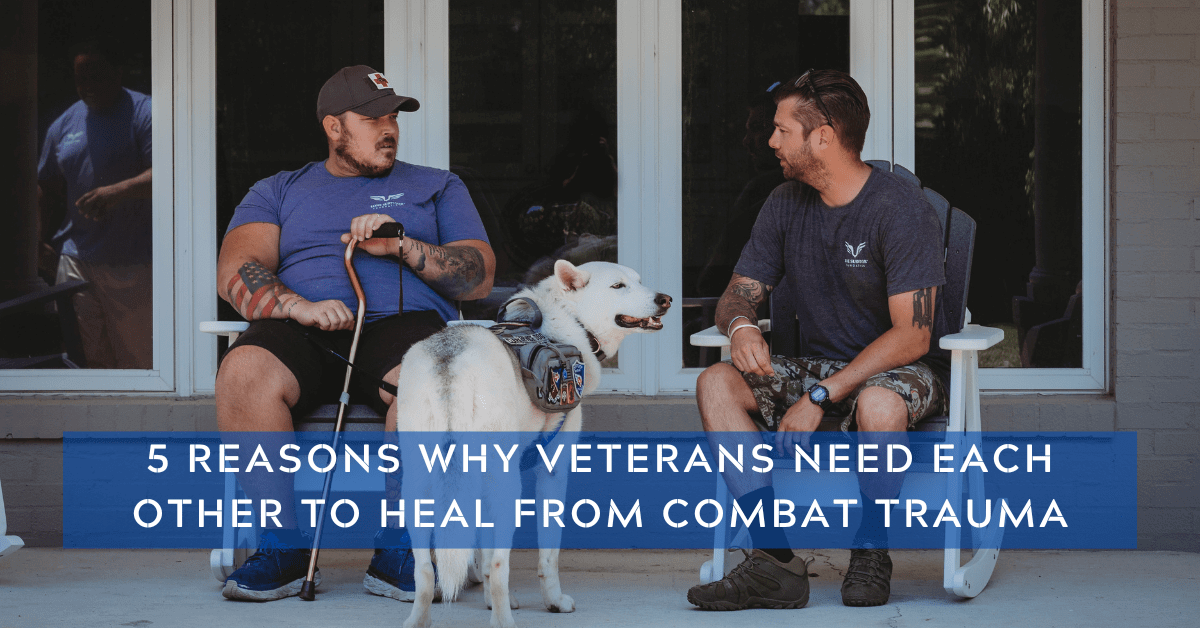According to research provided by the VA, 50-60% of all people will experience a traumatic event at some point in life. In addition, 7-8% will suffer from PTSD, and about 20% will live with chronic pain. For Veterans returning home from duty with a variety of physical and mental traumas, this means more people are experiencing some form of what they’re going through than they might first think.
Yet as common as these conditions are, there is often still a significant gulf between the experience of Veterans and civilians. While the suffering may be the same, the trauma that set it into motion is utterly unique. This can make the process of mentally unpacking and growing past it difficult, as Veterans can often feel isolated or unable to connect on a deeper level with their friends and family.
This is one of the many reasons why Veterans need each other to begin the road to recovery. Although anyone can learn to empathize with the people they care about (as discussed in a previous post), several aspects make the Veteran-to-Veteran connection unique. Today, we’re going to talk about five of the most significant factors our team has observed while serving our fellow Veterans at Lone Survivor Foundation.
Inside vs. Outside Perspective
With enough communication and listening, almost any human experience can be explained to another person. But there is a huge gap between understanding something and living it. This can leave people with incredibly unique traumatic experiences feeling like other people are watching their lives through a window instead of being a part of it. Talking about what happened with other Service Members often feels more natural and sometimes less like you have to explain what you’ve said.
The Survivor Mentality
Training in any branch of the Armed Forces ingrains a sense of pragmatism and level-headedness when approaching any dangerous situation. That mentality often spills over into life after service, too, even when talking about issues like chronic pain or PTSD. While some civilians may find a blunt, no-nonsense approach to these topics to be a breath of fresh air in a world that skirts around complex issues, wondering how a person may react can making opening up anxiety-inducing. Processing trauma with fellow Veterans means talking about it with people who share a similar mindset.
A Shared Language
Talking about mental and physical injuries often means talking at length about how you got them in the field. When getting into the weeds of what went down, that can mean a lot of military terminology and slang that might require subtitles when talking to a civilian. Especially at the beginning of your road to recovery, having to take time to explain tactical nuances or why you found yourself in a particular situation can be frustrating and maybe even discourage you from sharing altogether. Telling your stories to fellow Veterans means telling them in a way that feels fluid and natural, and that can be incredibly helpful as you begin processing through everything.
A Shared Pain
Chronic pain is far from uncommon in the United States, but it’s more prevalent with Veterans than any other demographic. In fact, as many as 1 in 3 have been diagnosed with some condition involving or related to chronic pain. If you are one of them, the odds of meeting a fellow vet with a similar condition are much higher than meeting a civilian with it.
Even more important is finding people who understand how debilitating that chronic pain can be. The amount of energy and mental function it can steal from you even on a “good” day can make it hard to even think about something as intensive as talking about PTSD. Partnering with fellow Veterans on recovery, especially in a group environment, can be both assuring and more productive because they understand the upkeep and compromises required.
A Tough Love Community
As Veterans, sometimes we just want a swift kick in the ass. We’ve spent years finding our physical and mental limits and then learning to push past them. We have learned to navigate situations that many would deem impossible because someone made us strap in and get it done. There is a fine line to this type of motivation when it comes to recovering from mental health challenges, but on our worst days, it can be incredibly valuable to have someone who knows when you need to be pushed to open up or put in more work when we don’t want to.
How Our Post-Traumatic Growth Program Fits In
If any of these points have resonated with you, but you don’t know where to go from here, Lone Survivor Foundation’s Post-Traumatic Growth Program is a great place to start. We created these programs in Texas and North Carolina specifically for the needs of those that returned home. We help Veterans start their recovery journey on the right foot by helping them connect and work through the crucial early steps together.
Because our programs are only for Veterans, that means we can completely tailor the resources to what they need. That includes providing tools to help with pain management, so our participants can have the energy and clarity they need to participate and learn. If you are interested in finding brothers in arms to help you grow past your trauma, we would love for you to apply here on our website. There are zero out-of-pocket costs to our participants thanks to our generous donors. We hope to see you there.






